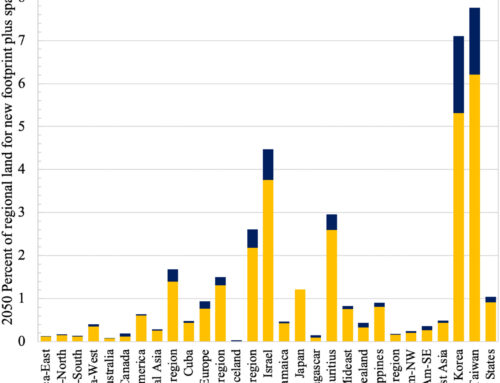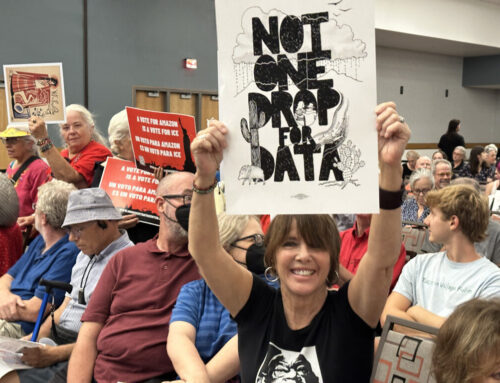Mass. has strong climate laws. A new Trump action aims to undo them
April 11, 2025
Advertisement

As President Trump has worked to dismantle many federal climate policies and initiatives, Massachusetts environmentalists have taken solace in the fact that states and municipalities have the power to set their own energy and environmental policies.
But this week, that premise was called into question. On Tuesday, Trump signed an executive action taking direct aim at state and local efforts to address climate change and environmental justice, and regulate planet-warming greenhouse gas emissions.
The action — titled “Protecting American Energy From State Overreach” — says these policies “threaten American energy dominance” and economic and national security. It directs the Attorney General to identify any “burdensome and ideologically motivated” laws and take action to stop their enforcement.
Some states, including California, New York and Vermont, are named in the order. Massachusetts isn’t, but the commonwealth has some of the strongest climate laws in the country and will almost certainly find its policies in the crosshairs of the administration, legal and environmental experts said.
“It is no surprise that Trump is trying to prevent states such as Massachusetts from continuing their vital work to end our reliance on fossil fuels and deploy clean energy and climate solutions,” U.S. Sen. Ed Markey, a Democrat, said in a statement. “Climate pollution knows no boundaries, and states and regions have the right to combat the climate crisis to protect their residents and economies.”
State Sen. Mike Barrett, a Democrat whose district includes Waltham and Concord, helped write and pass several recent major climate laws in Massachusetts. He was also critical of the executive action.
“This is one of the lamer things Mr. Trump has done,” he said. “And I think Massachusetts is not going to be deterred one iota.”
Massachusetts Attorney General Andrea Campbell did not respond to a request for comment. On Wednesday, she addressed other executive actions related to energy production and the environment, saying she would “advocate for and defend limits on greenhouse gas emissions and air toxins.”
Trump has long advocated for expanding production of coal, oil and gas, arguing it will boost the economy. Since taking office, he’s issued several orders intended to make good on his promise to “end” the growing renewable energy sector and “unleash American energy dominance” by opening up new federal lands and waters to drilling and coal mining.
Advertisement
David Cash, the former head of the New England office of the Environmental Protection Agency, said he wasn’t surprised by this latest attempt to rein in state policies.
“The Trump administration has taken extraordinary steps to subvert clean energy and climate policy,” he said. Still, he called the action “a breathtaking abuse of power.”
Cash listed several Massachusetts initiatives he expects will be at risk. They include a 2021 climate law that requires the state to zero out planet-warming emissions by mid-century and the state’s laws requiring electric utilities to buy increasing amounts of non-carbon-emitting power every year. He also said he expects the federal government to challenge the Regional Greenhouse Gas Initiative, a cooperative carbon trading effort by several Northeast and mid-Atlantic states aimed at reducing climate pollution from the power sector.
“All of those will be targeted,” he said. “I do not think [the challenges] will be successful, but it’s another shot across the bow. It’s another very public way for the president to show his support for the fossil fuel industry.”
Other legal experts said the executive action amounts to political grandstanding and likely would not withstand legal challenges.
This order is “garbage,” said Michael Gerrard, director of the Columbia University Sabin Center for Climate Change Law. “The president does not have the power to cancel state laws or regulations.”
Gerrard said he thinks the move is intended to intimidate some states and municipalities into backing down on efforts to reduce climate pollution.
After the executive order was released Tuesday, Gerrard said he received calls from officials in several states asking if they need to worry about it. On a scale of one to 10, he said he rates the actual risk to state climate policies at a 1.5.
“But how worried am I that it’ll cause some states or cities to be to back off what they’re doing? Maybe I’d give that a six,” he said.
Not everyone in Massachusetts is upset about the new directive from the Trump administration. Paul Craney of the Mass Fiscal Alliance said the President’s actions could help make energy prices more affordable in the state.
“Ratepayer concern over cost and reliability take a back seat under Massachusetts’ climate mandates,” Craney wrote in an email. “The President’s actions on energy seeks to curtail states from further putting themselves at this disadvantage with other regions of the country.”
In the days since Trump signed the directive, several states have already vowed to fight back, including Vermont, New York, New Mexico and Colorado. California Gov. Gavin Newsom went so far as to call Trump’s directive “a glorified press release masquerading as an executive order.”
Maria Hardiman, a spokesperson for the Massachusetts Executive Office of Energy and Environmental Affairs called the action “yet another unlawful overreach,” and said it would “undermine the clean energy transition that is creating jobs, advancing new technologies, and protecting communities in Massachusetts and across the United States.”
Massachusetts, she added, is already feeling the effects of climate change. In the last few years, the state has experienced historic floods, more intense heat waves, drought and wildfires.
Search
RECENT PRESS RELEASES
Related Post




